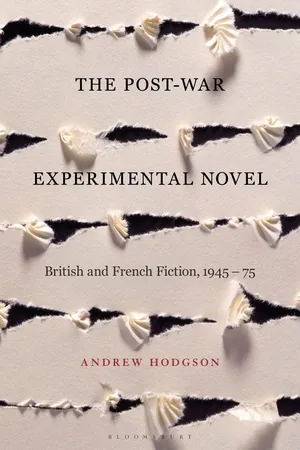
- 192 pages
- English
- ePUB (mobile friendly)
- Available on iOS & Android
About This Book
Delving into how the traumatic experience of the Second World War formed – or perhaps malformed – the post-war experimental novel, this book explores how the symbolic violence of post-war normalization warped societies' perception of reality. Andrew Hodgson explores how the novel was used by authors to attempt to communicate in such a climate, building a memorial space that has been omitted from literatures and societies of the post-war period. Hodgson investigates this space as it is portrayed in experimental modern British and French fiction, considering themes of amnesia, myopia, delusion and dementia. Such themes are constantly referred back to and posit in narrative a motive for the very broken forms these books often take – books in boxes; of spare pages to be shuffled at the reader's will; with holes in pages; missing whole sections of the alphabet; or books written and then entirely scrubbed out in smudged black ink. Covering the works of B. S. Johnson, Ann Quin, Georges Perec, Roland Topor, Raymond Queneau and others, Andrew Hodgson shows that there is method to the madness of experimental fiction and legitimizes the form as a prominent presence within a wider literary and historical movement in European and American avant-garde literatures.
Frequently asked questions
Information
Notes
Preface
Partition One
Table of contents
- Cover
- Half-Title Page
- Title Page
- Dedication
- Contents
- Preface
- Partition One – Motive: The Sense Something is Missing
- Partition Two – Diagnoses: The Confused Narrative of the Post-War Human
- Partition Three – Treatment: Breaking Down Within the Horizon of the Real
- Notes
- Index
- Copyright